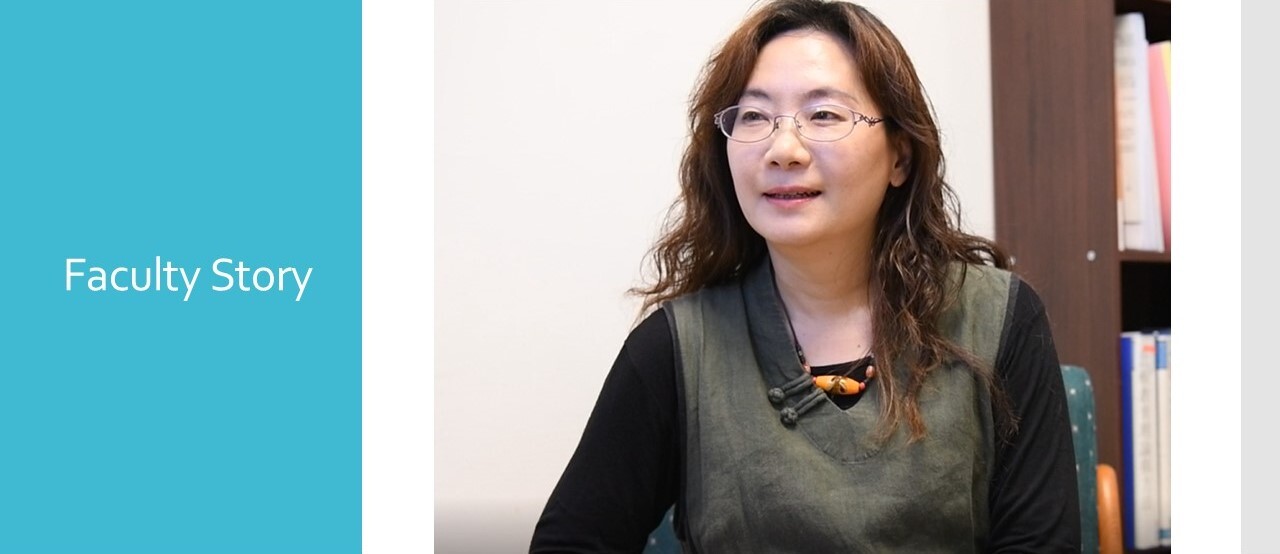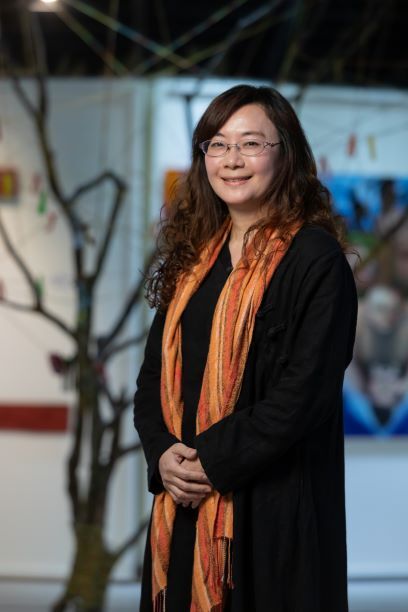Pursuer of a borderless education — Professor Hung Wen-jou

The adage “crouching tigers, hidden dragons” is an apt description of National Chi Nan University’s faculty members and instructors, who are all top of their respective fields yet content to give their all to bettering the lives of students studying amidst the mountains of central Taiwan. Like master martial artists of the yore, teachers such as Hung Wen-jou (洪雯柔) pass on their skill sets selflessly in hope of preserving age-old knowledge and fostering generational progress.
Professor Hung of NCNU’s Department of International and Comparative Education comes from a background steeped in classical Chinese literature, which gave rise to her humanistic approach to teaching. Speaking foremost as an educator, Hung espouses logic and warmth as she firmly guides students to explore the world that lies beyond the campus borders. The time and effort invested far exceed what is required by the school.
Passionate about people, cultures, and world literature, the alumna of National Taiwan University’s Department of Chinese Literature enrolled in NCNU as a graduate student in 1995, the university’s founding year. Hung explained that her family’s financial situation ruled out any chances of studying abroad, so she chose to pursue comparative education to learn more about foreign academic theories and alternative educational paradigms.
She became NCNU’s first doctoral graduate and the holder of a Ph.D. diploma numbered 001. Putting theory to practice, Hung is now active in Taiwan and abroad as an academic researcher and university professor.
It was with the professor’s invaluable help that NCNU established the world’s premier bachelor’s degree in comparative education. While many western institutions do offer similar graduate programs for studying academic theory, strategy, and law, NCNU’s undergraduate program is unique and often piques the interest of visiting foreign scholars.
Postgraduate institutes are set up overseas to prepare students for graduate and doctoral courses, Hung explained, with a recruitment emphasis on those who have studied a second language, as that is essential to comparative education studies. Most Taiwanese students however, lack the opportunity to achieve that linguistic foundation as well as “solid groundwork in cultures, social studies, politics, economics, and philosophy,” she said, which is why NCNU aims to foster interdisciplinary talents during the bachelor’s level.
One of the founding objectives of NCNU’s Graduate Institute of Comparative Education is to send at least one student per year to an international conference — a milestone achieved before the government began to formulate subsidies with the same aim. As NCNU has the highest percentage of overseas compatriot students to Taiwanese students, all those enrolled here are studying in a culturally diverse environment, but professors like Hung know that the duration and exposure of overseas exchanges are equally instrumental.
The Graduate Institute of Comparative Education has been deepening its comprehensive curriculum encompassing macro perspective, international exchange, volunteer service, and overseas experience since 2006. Moreover, after professor Hung took up the post of director of NCNU’s Department of International and Comparative Education in 2008, the inaugural volunteer group was formed, with the training period extended from 3 or 4 weeks to a full year.
While earlier Taiwanese generations held good records for performing well overseas, students these days require more encouragement and guidance. “Nowadays, Taiwan’s overseas volunteering initiatives are largely organized independently by students, but our programs are accompanied by instructors all the way, providing a more structured learning experience,” she pointed out.
Hung speaks from her decade-long experience in leading such teams, in which she makes herself fully available by accompanying them on a daily basis for at least the first two weeks. In their new environment full of uncertainties, the students seek emotional support as well as honest counsel, she explained.
And the uncertainties are numerous. Hung recalled that once, team members tasked with teaching elementary students were surprised when they started receiving adult students as well. Another time, a course designed for 30 students ended up with 90 students. When such challenges strike unpredictably, team members are left exhausted, devoid of energy to even muster up an emotional response.
One of the biggest upsets took place in Vietnam. The volunteers had just finished setting up the stage at the host school when local teachers stormed in, forcibly took away the microphone, and ordered all members of her team to leave.
Even though they were unable to carry out the Mandarin-language teaching session that they’ve been planning for so long, Hung consoled them by explaining that such incidents are commonplace in this line of work, and that they should focus instead on brokering a solution. In this case, Hung had a secondary plan in place, and her students were able to constructively channel their frustrations into another way to serve the Vietnamese school.
Overseas cooperation is forged upon long-term dedication and planning. Hung’s first venture in Vietnam began with the VNU University of Social Sciences and Humanities about 11 years ago, and that partnership continues to bear fruit today, as delegations put together by both parties steadily expand their scope of service. Despite the mounting challenges, including a “devastating” amount of preparation this year, the professor has also been making headway into Indonesia and northern Thailand.
“When students get pushed out of their comfort zones, self-doubt strikes,” said Hung, adding that she had to return certain proposals up to 12 times this year because the students had not taken into consideration the perspectives of those who did not grow up in the same culture. She knows that without the proper mindset, volunteers will not be able to react in time when something doesn’t go as planned. From course design and presentation delivery to observational and crowd-commanding skills, teacher and team spend many late nights — and the occasional all-nighter — in preparation for the unknown.
Patience and guidance do pay off. When 20 of her students waiting for their 6-hour trip to the countryside were greeted by a 20-seat minivan with no luggage space, they were able to ease into negotiations with the driver who ignored previous agreements while recruiting the help of their local partners on this trip. Such displays of emotional intelligence are signs that they are jumping through hurdles and gaining new maturity in the process, and these are the very moments that continue to motivate her on a personal level.

In recent years, she has also been recruiting overseas compatriot students after discovering their love for travel and passion for serving as cultural interpreters mediating between different societies, especially when it came to introducing their hometowns. Australia, as a forerunner in fulfilling the demands of international education, is another target country on her horizon for many reasons, including its cultural emphasis on individuality that can teach her students a different set of skills and viewpoints contrasting those nurtured in a community-oriented society.
As Hung previously served as the university’s dean of international and cross-strait affairs, she is also uniquely aware of NCNU’s financial subsidies that students can apply for to offset the costs of studying overseas. NCNU’s Department of International and Comparative Education is characterized by hands-on training and tailored support, she added.
Equipped with the ability to execute and manage, up to 30 percent of students who graduate from her department go on to pursue careers in international affairs. This, she explained, is all made possible by the department’s educational strategy and an incredible lineup of instructors who are always on the lookout for new, diverse learning opportunities for students under their care.
“Transnational experience” has become one of the most sought-after skills in the era of globalization. Data provided by the Directorate General of Budget, Accounting and Statistics reveal that 736,000 Taiwanese nationals were working abroad in 2017, with 84% of that figure translating to 405,000 in the greater China region, 109,000 in Southeast Asia, and 101,000 in the United States. In partnership with sister universities and industry representatives, NCNU is working to bolster the global employability of students across all academic fields.
International mobility will continue to drive demand for cross-cultural matchmakers and managers. To best prepare students for the long journeys ahead, NCNU is offering foreign languages, diverse opportunities and resources, guidance, and a competitive edge in real-life skills to help more alumni shine on a borderless world stage.
Interviewed by Zoe Cheng
Photographed by Jack Yu
Translated by Min Chao
Those who are interested in learning more about the professor and her field can contact her at hungwj@ncnu.edu.tw.

